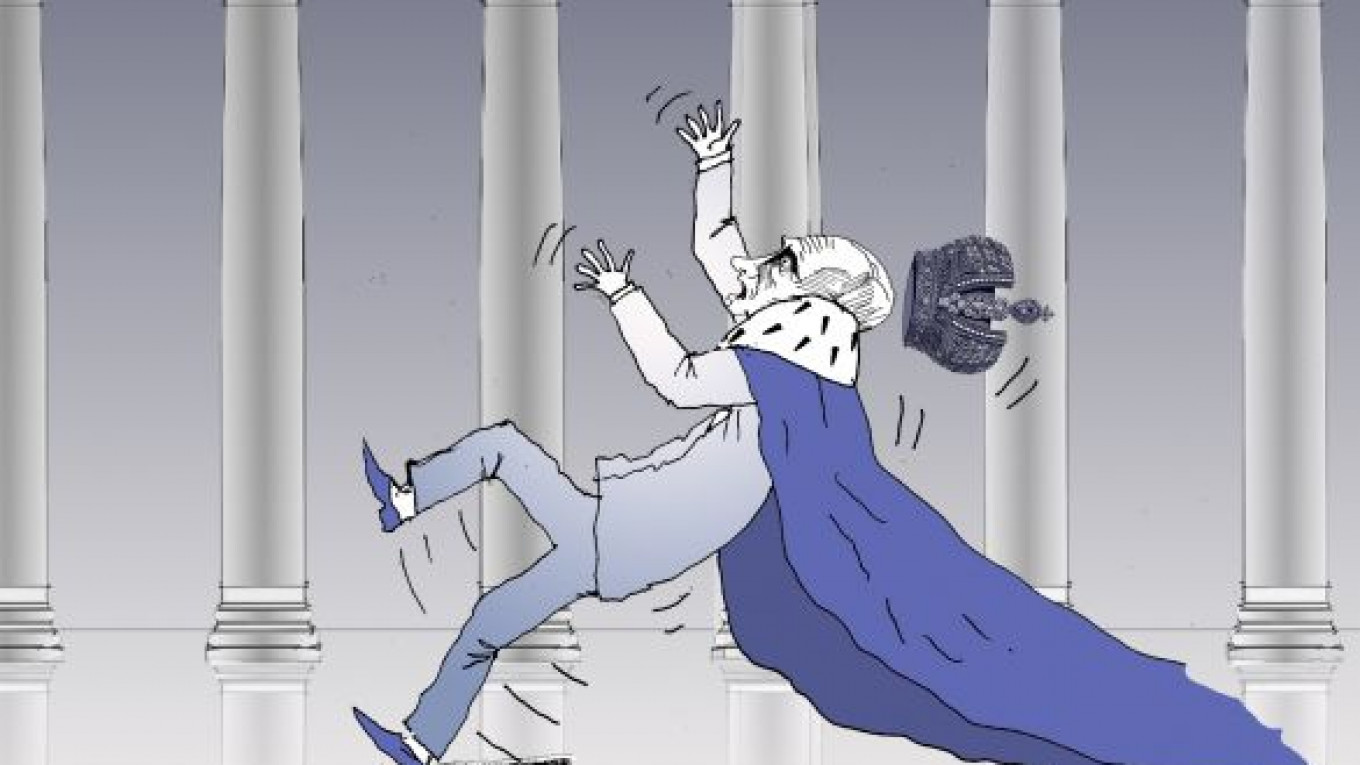The dramatic trial and sentencing of the Pussy Riot band members captured the imagination of Western observers but has not resonated so much at home. Why has the band been so successful in gaining international attention, and what is the long-term historical significance of the Pussy Riot phenomenon?
Behind their punk Western image, it is important to recognize that Pussy Riot emanates from a long-standing tradition of dissent by the Russian intelligentsia. To borrow a Leninist term, Pussy Riot is Western in form but Russian in content. The Western-derived medium of a punk performance is delivering a very Russian message.
One obvious lesson to draw is the disruptive potential of the Internet. If a picture is worth 1,000 words, then in the age of YouTube, a video is worth 10,000. The striking images of colorfully dressed women dancing in front of the ornate gilt altar of Christ the Savior Cathedral — the country's crowned Orthodox jewel — against a curious but ear-catching soundtrack, proved irresistible to global audiences. It spawned copy-cat action in a Cologne cathedral, demonstrations of support in dozens of cities from Marseilles to Sydney, and expressions of sympathy from the likes of Madonna and Paul McCartney.
The all-thumbs Russian government added fuel to the fire by arranging a clumsy show trial that culminated with the women sentenced to two years of corrective labor for "hooliganism motivated by religious hatred."
Pussy Riot succeeded in drawing global attention to the cause of human rights in Russia in a way that dozens of reports of the beatings and killings of journalists, or the cruel death of lawyer Sergei Magnitsky in pretrial detention, had failed to accomplish. Just 41 seconds of tape, lengthened to three minutes by the addition of material recorded elsewhere, succeeded in undoing the Kremlin's multimillion-dollar program to boost Russia's soft power and its global image.
Much more interesting than the band's antics in the cathedral, however, were the closing statements that the three defendants delivered to the court, which New Yorker editor-in-chief David Remnick described as "a kind of instant classic in the anthology of dissidence." Each woman took a different theme. Yekaterina Samutsevich dissected the unhealthy fusion of church and state. Maria Alyokhina talked about the deficiencies of the country's education system and the suppression of the individual. Nadezhda Tolokonnikova offered a critique of the "autocratic political system" in general and the conduct of their prosecution in particular.
The statements portray a society that is passive and disoriented in the face of an all-powerful ruling bureaucracy. Their critique is spiritual rather than material, and they are not particularly interested in leveling accusations of corruption, which have been the central theme of the mainstream opposition.
Many Russian observers have been dismissive of Pussy Riot, characterizing their provocative actions, including previous performances of a sexual nature, as infantile and offensive — and unpopular with the public at large. But it is not at all clear whether Pussy Riot expects or even desires a groundswell of public support. They do not aspire to be leaders of a revolutionary movement, either Orange or Leninist.
Rather, their appeal for truth and freedom puts them squarely in the tradition of the 19th-century Russian intelligentsia. Tolokonnikova directly referred to the group's punk antics as equivalent to the truth-telling "holy fools" of centuries past and embraced the idea that their prison sentence proves the virtue of their cause.
Pussy Riot adopted the tactics of protest from the Situationists of 1960s France, the punk rockers of 1970s Britain and the feminist Riot Grrrls in the United States in the 1990s. The idea of donning masks comes from the movie "V for Vendetta," which was popularized by the Occupy movement.
But the strategy of Pussy Riot has a deeper foundation. Their moral critique of authority and appeal to a higher truth is rooted in pre-revolutionary Russia, a tradition that fitfully resurfaced during the Soviet years. They cite 19th-century literary critic Vissarion Belinsky and Fyodor Dostoevsky, but not Voltaire, John Stuart Mill or other representatives of the Western liberal tradition.
The assertion of an individual's right to exist — what Alyohkhina refers to as "inner freedom" — is not a problem for young people living in the West and has not been for a century or more. Whatever the shibboleths that are evoked by today's Western radicals — such as capitalism, neoliberalism, Empire and racism — they are phenomena quite different from the challenge posed by the authoritarian Russian state.
There are, of course, many points of overlap between Pussy Riot and their Western supporters. They both want Russia to respect human rights and allow free elections. But even if Western pressure succeeds in freeing the band members, it is unlikely that Pussy Riot will be able to leverage their Western support into concrete political gains. Like their 19th-century counterparts, they will be on their own, which does not mean that they will not eventually be victorious.
Peter Rutland is a professor of government at Wesleyan University in Middletown, Connecticut.
Related articles:
A Message from The Moscow Times:
Dear readers,
We are facing unprecedented challenges. Russia's Prosecutor General's Office has designated The Moscow Times as an "undesirable" organization, criminalizing our work and putting our staff at risk of prosecution. This follows our earlier unjust labeling as a "foreign agent."
These actions are direct attempts to silence independent journalism in Russia. The authorities claim our work "discredits the decisions of the Russian leadership." We see things differently: we strive to provide accurate, unbiased reporting on Russia.
We, the journalists of The Moscow Times, refuse to be silenced. But to continue our work, we need your help.
Your support, no matter how small, makes a world of difference. If you can, please support us monthly starting from just $2. It's quick to set up, and every contribution makes a significant impact.
By supporting The Moscow Times, you're defending open, independent journalism in the face of repression. Thank you for standing with us.
Remind me later.


